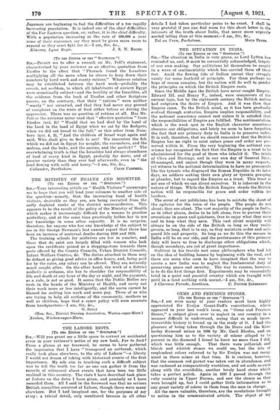[To THE EDITOR Or THE " SPECTATOR."] Sre,—Permit me to
offer a remark on Mr. Pe11's statement, characterized by your reviewer as an effective quotation from Exodus to the effect that "Pharaoh found the Israelites multiplying all the more when he strove to keep down their numbers by hard work and scanty rations." Whatever relation may be established between the hard work—probably the corcee, not serfdom, to which all inhabitants of ancient Egypt were occasionally subject—and the fertility of the Israelites, all (ho evidence from the book of Exodus and other Scripture proves, on the contrary, that their " rations " were neither " scanty " nor unvaried, and that they had never any ground of complaint on the score of food either before or during the oppression. There was no question of rations at all. Has Mr. Pell or the reviewer never read that " effective quotation" from Exodus (xvi. 3)? " Would that we had died by the hand of the Lord in the land of Egypt when we sat by the fleshpots, when we did eat bread to the full," or this other from Num- bers (xvi. 4, 5), "And the children of Israel wept again and said, Who shall give Its flesh to eat? We remember the fish which we did eat in Egypt for nought; the cucumbers, and the melons, and the leeks, and the onions, and the garlick?" The overwhelming truth is that the Israelites had always abundance of food of every kind in Egypt, probably far more, and of greater variety than they ever had afterwards, even in " the land flowing with milk and honey."—I am, Sir, &c.,


































 Previous page
Previous page